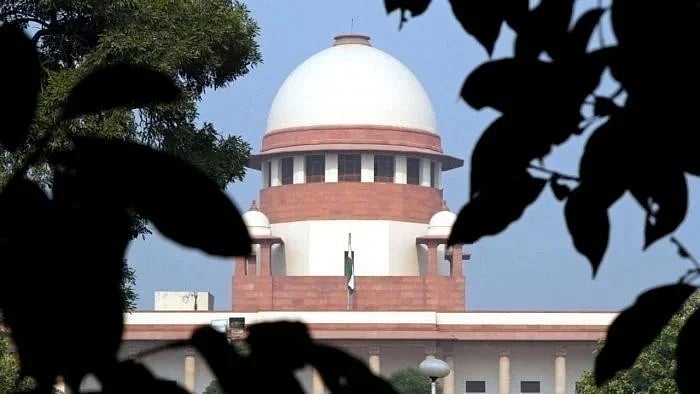
The Supreme Court of India.
Credit: PTI File Photo
New Delhi: The Supreme Court has held that there should not be a single order by the high courts and the trial courts for grant of regular bail or anticipatory bail on the basis of any accused or his or her family members giving an undertaking to deposit a particular amount.
"Henceforth, no Trial Court or any of the High Courts shall pass any order of grant of regular bail or anticipatory bail on any undertaking that the accused might be ready to furnish for the purpose of obtaining appropriate reliefs," a bench of Justices J B Pardiwala and R Mahadevan said.
The court said that the high courts as well as the trial courts should decide the plea for regular bail or anticipatory bail strictly on the merits of the case.
"The High Courts and the Trial Courts shall not exercise their discretion in this regard on any undertaking or any statement that the accused may be ready and willing to make," the bench said.
The court said it noticed over a period of time that orders of regular bail and anticipatory bail are being passed by different high courts subject to deposit of some amount.
"We have come across cases like the one in hand where accused persons have gone to the extent of filing affidavits in the form of undertaking that they would deposit a particular amount within a particular period and then conveniently resile from such undertakings saying it is an onerous condition," the bench said.
In some cases, the court pointed out, perhaps the accused may abide by such undertaking, but the experience so far has been that in many cases the accused later would not abide and flout the undertaking, the court added.
"In many cases it would be argued on behalf of the accused that he had never made such a statement and the court on its own had recorded in the order that the accused is ready and willing to deposit a particular amount. At times the entire blame is thrown on the lawyer in making such statement for the purpose of obtaining order of bail or anticipatory bail as the case may be," the bench said.
In the case before the court, appellant Gajanan Dattatray Gore challenged the Bombay High Court's order of July 1, 2025. He was arrested on August 17, 2023 following lodging of a cheating and forgery case with Satara police station. He was accused of misappropriation Rs 1.60 Cr.
The trial court refused him bail. But the high court allowed his release on bail on April 1, 2024, subject to him depositing Rs 25 lakh with trial court, following an undertaking given by his counsel.
Subsequently, he failed to deposit the money and the high court modified its previous order on a plea by the complainant.
Dismissing the appeal with Rs 50,000 cost for gross abuse of the process of law, the bench said, "In any circumstances the High Courts or trial courts shall not pass a conditional order of regular bail or anticipatory bail."
"The case in hand is one in which the appellant on his own free will and volition filed an affidavit in the form of an undertaking before the High Court that he would deposit an amount of Rs 25,00,000 but ultimately resiled to do so and the High Court had to cancel the bail. It was too much for the lawyer of the appellant to argue before the High Court that asking his client to deposit Rs 25,00,000 was unreasonable. It reflects on the professional ethics," the bench said.
